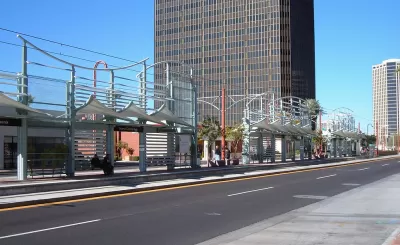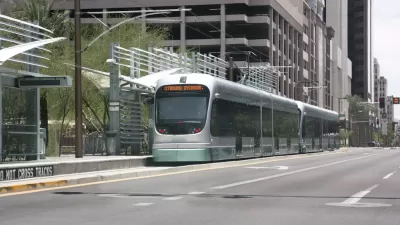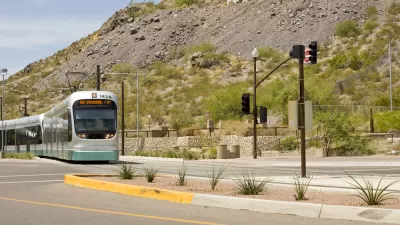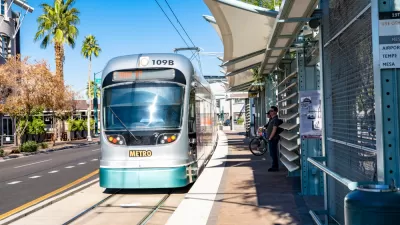Transit advocates are saying the Koch Brothers are responsible for a sudden outbreak of controversy surrounding the South Central Light Rail Extension in Phoenix.

Ahead of a critical vote on a panned light rail extension in Phoenix, Jessica Boehm reports on the financial interests behind the "grassroots" opponents and supporters of a plan to reduce the automobile lanes on Central Avenue to make room for the light rail extension.
Renewed debate over the extension began in March, when a group of south Phoenix business owners asked the council to reconfigure the project to maintain four traffic lanes on Central Avenue. The current plan would reduce the thoroughfare to two lanes.
The Phoenix City Council approved the two-lane plan in 2014 and voters approved funding for the project in 2015. But some south Phoenix residents have said they weren't aware of the lane decrease until this year.
The controversies over the lane reconfiguration has provoked a political action committee called Building a Better Phoenix to begin the process of acquiring signatures "to send back the light rail funding issue to the voters," according to Boehm. The City Council has also discussed shifting some of the funding approved by voters for transit in 2015 to street projects instead. An article by the Associated Press provides more detail about the protests that have raised the light rail plans to the level of controversial in recent months.
"At the same time, a group called Arizonans for Transportation launched a polished website and social media campaign dubbed 'Build South Central' to push back against the anti-light rail messaging," adds Boehm.
Neither organization has revealed the sources of its funding, but Angie Schmitt is willing to press further in assigning credit for Building a Better Phoenix to the Arizona Free Enterprise Institute, which is a "Koch-connected dark-money group," according to a 2o16 article by Laurie Roberts.
FULL STORY: Koch brothers? Valley Metro? Who's paying for pro- and anti-light rail campaigns?

Trump Administration Could Effectively End Housing Voucher Program
Federal officials are eyeing major cuts to the Section 8 program that helps millions of low-income households pay rent.

Planetizen Federal Action Tracker
A weekly monitor of how Trump’s orders and actions are impacting planners and planning in America.

Ken Jennings Launches Transit Web Series
The Jeopardy champ wants you to ride public transit.

Milwaukee Road to Get Complete Streets Upgrades
The city will reduce vehicle lanes and build a protected multi-use trail including bioswales and other water retention features on its ‘secret highway.’

Tackling Soil Contamination With Nature-Based Solutions
Los Angeles County residents and experts are turning to nature-based methods like bioremediation to address long-standing and fire-exacerbated soil contamination without resorting to costly and disruptive removal.

Rebuilding Smarter: How LA County Is Guiding Fire-Ravaged Communities Toward Resilience
Los Angeles County is leading a coordinated effort to help fire-impacted communities rebuild with resilience by providing recovery resources, promoting fire-wise design, and aligning reconstruction with broader sustainability and climate goals.
Urban Design for Planners 1: Software Tools
This six-course series explores essential urban design concepts using open source software and equips planners with the tools they need to participate fully in the urban design process.
Planning for Universal Design
Learn the tools for implementing Universal Design in planning regulations.
Ada County Highway District
Clanton & Associates, Inc.
Jessamine County Fiscal Court
Institute for Housing and Urban Development Studies (IHS)
City of Grandview
Harvard GSD Executive Education
Toledo-Lucas County Plan Commissions
Salt Lake City
NYU Wagner Graduate School of Public Service





























